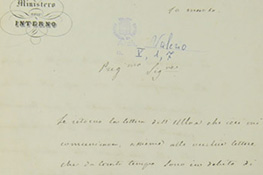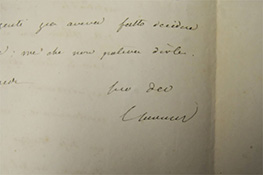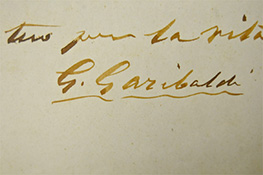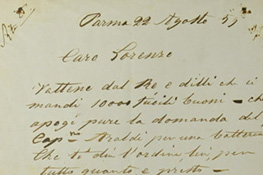Versione italiana English version Version française Versión en español
We can count the correspondence of Lorenzo Valerio among the most important archives of the Resurgence.
In fact Valerio (Turin 1810 - Messina 1865), cultural organizer and liberal politician, elected deputy since the eighth Legislature of the Kingdom of Italy (the first after the Unification of Italy), appointed by Vittorio Emanuele II governor of the province of Como, then extraordinary governor of the Marches immediately after the Unification of Italy, finally senator of the Kingdom and prefect of Messina, maintained close relations with all the protagonists of the history of the time.
In his Turin home, where a crowded salon of intellectuals and liberal patriots was held, the Hymn was presented and then set to music by Michele Novaro whose verses had been written in 1847 by the young patriot Goffredo Mameli.
Valerio founded and directed the periodical Letture popolari (then Letture di famiglia), which had great importance for the spread of liberal and democratic ideas among the young people of the Piedmontese bourgeoisie, and later the political newspaper La Concordia. A member of the Agrarian Association (where he was in sharp contrast with Cavour) and of the Society of Kindergartens in Turin, in 1842 he promoted the birth of one of the first kindergartens and a boarding school for the women of the mill in Agliè.
His correspondence, between the 1830 and 1865, contains a wealth of information on the political and cultural relations of the time, of fundamental importance for the Italian unitary process: Overall, there are over 2800 letters of eminent political and literary personalities from the 1800s. We find in this list Cavour, D'Azeglio, Gioberti, Cristina di Belgioioso, Balbo, Cattaneo, Bixio, Garibaldi, Depretis, Crispi, Guerrazzi, Manin, Lanza, Mameli, Minghetti, Pisacane, Poerio, Rattazzi, Saffi, Viesseux among Italians and among foreigners General Chrzanowski, Victor Hugo, Kossuth, Prince Jerome Napoleon. But we also meet a crowd of minor characters who, however, give us back the atmosphere of those years, such as the Hungarian and Polish refugees, and the writers of the lettere dal campo, written to the editorial staff of Concordia during the campaign of 1848. The publication of these materials, edited initially by Luigi Firpo and then by Adriano Viarengo, is ongoing and has reached the fifth volume.
The Valerio Collection also contains 49 letters addressed to Niccolò Tommaseo from various correspondents, a small Arago correspondence.
The archival material is supplemented by a small library, composed of about sixty volumes.
Cavour
In the Fund we find 17 letters from Count Cavour addressed to the deputy Lorenzo Valerio, dated between 1852 and 1860.
Among them is one from March 1852, which recalls the bloody riots that occurred in Sassari on 24th February of that year. In another, of 19th September 1856, Cavour transmitted to Valerio the book by Bayle St. John on Piedmont The subalpine kingdom, or experiences and studies in Savoy, Piedmont, and Genoa. There are also numerous letters of courtesy, or intended to fix the deputy a series of appointments at the Ministry of the Interior. On another occasion, in a letter dated 10th March 1859, expressing his political opinions divergent from those of Valerio, Cavour stigmatizes the revolution: "we must not reject the insurrectional element, or, if you like, revolutionary, but it cannot be administered in too strong doses, either because of Europe, or because of one's own country, which has no stomach to digest it, if not moderately."
Garibaldi
The Valerio Fund consists of a precious appendix, a small corpus of documents consisting of autograph letters, or photocopies of autographed letters, and some popular poems, especially of patriotic theme. Among the autograph letters there is one in particular, still unpublished, addressed by Giuseppe Garibaldi to Lorenzo Valerio and dated Parma, 22nd August 1859. In this letter Garibaldi makes explicit request for 10,000 rifles, with which, he announces, "we will make Italy in spite of the devil".
- Archive inventory (pdf 441 KB)




